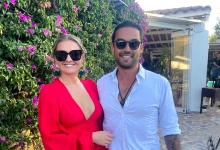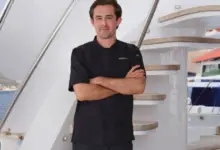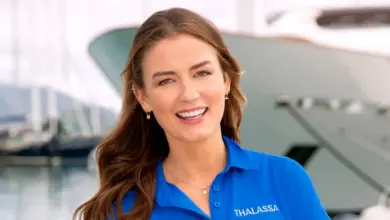Below Deck chef Jono calls himself a culinary architect, a builder of fun, and insists Below Deck Mediterranean wouldn’t be possible without him.
In this current Below Deck Mediterranean season, the crew has dealt with internal and external drama. From huge weather storms to personal upheavals, nothing is smooth sailing. For Chef Jono, he has weathered each wave and set himself up for continual improvement.
Chef Jono, Johnathan Shillingford, stepped into the Bravo world and brought a big personality to the galley. It seems that he is always willing to offer a kind word, vibrant smile, or occasional dance break to help alleviate some tensions.

But, his food has not always been culinary perfection. After stern scolding from Captain Sandy, he seems to have righted the ship during the season. It is always difficult to appease the demanding guests, but this self-taught chef is willing to put in the effort.
Recently, I spoke with Chef Jono via email. While Below Deck Mediterranean fans will have to watch the rest of the season, it seems that the affable chef is ready, willing and able to make it a memorable one.
Cristine Struble: What drew you to becoming a yacht chef and do you think that being self-taught is a benefit or a detriment to your position?
Chef Jono: “I have always loved food. I think being from the Caribbean, there’s a huge culture of food where it’s the gift of love. When I’m going home on Christmas break or something when I was in college, the first thing my dad would ask is, what do you want to eat when you arrive? I’ve always loved food. I’ve had a very close relationship with food growing up all through architecture school.”
“I became a yacht chef by accident when my best friend, who was another yacht chef, was on a yacht that needed a chef for like a week. And she’s like, Jono, please do this. Like, you’re amazing at cooking. I was used to throwing lots of dinner parties for friends and stuff at home. And she knew that I was pretty good at cooking. So I did this for a week and it turned into two years on that first yacht. And that’s where I think I learned the most. In the first episode, I think they teased me not knowing where to put the trash out on a boat. I’m getting in trouble for it because I didn’t take the trash out.”
“That’s how I became a chef. I think I always loved cooking, but the appeal of yachting was the travel. I left the Caribbean when I was 17, I had lived in Chicago for my first degree, in London for my second degree, I worked in Paris for a bit, and I spent some time in Rio. I loved traveling from the get-go. I guess yachting kind of afforded that as well as turning one of my passion projects into a profession.”
Struble: Do you think that being self-taught is a benefit or a detriment to your position?
Chef Juno: “I think (being self taught is) a benefit, 100%. I think I’ve loved that I’ve been able to teach myself. I don’t have to unlearn things that I maybe would have learned in culinary school to approach food in a more kind of fusion way or a more design way where having been self-taught, I’ve been able to not be latched onto a classic French recipe and doing it this way. I’m like, let’s put a spin on it and make it even more unique or more favorable. So definitely it is a benefit, not a detriment, never a detriment.”
Struble: Do you think that cooking in a galley is easier or harder than in a professional kitchen?
Chef Jono: “Anything on a yacht is 100% harder. Any department, I think, especially in the galley, people compare food on a yacht to a restaurant. That’s the biggest mistake because at a restaurant, there’s like 10 chefs. On Mystique, I was by myself. So that’s a whole other challenge”.
“And then, in a galley, you have certain equipment that you can’t have on a yacht, like open flames and things like that, that add different flavor profiles to different types of food. I think cooking on a yacht is definitely more challenging than at a restaurant kitchen.”
Struble: In some of your Instagram posts you call yourself a culinary architect. How did your architecture training help you in the culinary world? And are there similarities to the creative aspects?
Chef Juno: “They’re so similar. I think it’s crazy. Since I’ve started branding myself as a culinary architect, I’ve noticed so many other architecture friends who kind of transition to cooking or have similar kinds of brands. I think for me, the influence is the process.”
“With architecture, you start from inspiration. I think as a chef, a lot of times the inspiration is the food. If you have an amazing product, like, oh wow, this tomato is amazing. Let me make the most beautiful bisque, or something with this, because that’s inspiring you.”
“Other times, it’s preferences that inspire you as a chef, right? Which is the same as architecture or a client coming in being like, oh, I want this two-bedroom house, but I want it to float over the water. And you’re like, oh wow, my mind’s blown.”
“Sometimes a guest comes in and they’re like, we want something that’s gluten-free, dairy-free, vegan, keto. And I’m like, okay, that means I can’t cook anything. Then it gets your gears turning and that preference or that somehow limitation to the food can be a huge inspiration.”
“I think those are the kind of similarities that I pull from both professions. I think it’s the way I approach inspiration through to execution.”
“And then, the joy, right? When I design a house for someone and they love it and I see it built, I’m like that’s amazing. It’s the same with food, except it takes about an hour, whereas a house takes a year or more. And so you feel that joy a lot faster, that gratification as a chef.”
Struble: This Below Deck season has been a rollercoaster in the galley. Have you ever had such difficult charter guests? And how hard has it been to manage the demanding preferences?
Chef Juno: “It’s very demanding. Captain Sandy says this, it’s about managing expectations for guests. (there have been) a lot of the varied preferences; some charters you have not too many crazy different preferences. The ones that were crazy at the time felt like, okay, well, how am I going to do this? Watching it over, I could see in retrospect, a lot of these varied preferences maybe weren’t really that realistic. I don’t know if I could have said something at the time, I don’t know.”
“I’m proud of how I dealt with it and got through those varied preferences. I think there was no charter where, you know, at least two people were not happy, right? For me, two out of eight is still not good enough, but (it is) not a fail. And for me, learning from that, it’s just being able to maybe pull more things out of the bag from crazy preferences.”
Struble: In some instances, the charter guests were less than pleased with the food. What would you have done differently in those situations? And do you think that they would have been difficult to please no matter what?
Chef Juno: “I think some people are difficult to please no matter what. Unfortunately, I didn’t have that much guest-facing time because I was always stuck in the galley cooking. So, I wouldn’t have been able to gauge if they were the type of people to be difficult no matter what.”
“But what would I have done differently when they were not pleased by the food? I mean, what else can I do differently? Yeah, I mean, I think that maybe I would have gone out and spoken to them more.”
“I think the Gigi charter, I was shocked when they left, and they said that they hated the food because Sandy gave me some feedback halfway through that charter. But every time I went out, they never said, “I don’t like this”. They were kind of like, “oh, okay, yeah, nice, nice”. I think it was difficult to kind of gauge in that moment how to correct halfway through or how to do better. Typically, I go out after every meal, and if someone says, ‘oh, it was too salty or too spicy.’ then I can correct and be sure that the next meal is hitting on their preferences.”
Struble: Which charter do you think is the best representation of your food?
Chef Juno: “The Charleston charter was really fun because they were such amazing people, and they loved everything. Even this last group of guests, the ones who were a little bit rude, I was really proud of my food that time. I think they had a different style, more gastro food.”
“For me, plating (is something) I love it so much. I think I took the time to maybe prep a bit more so that I could spend more time with plating and making sure things were like ‘gorgina.’ I would say that so far has been my best representation. But, I think it was just so many challenges working on Mystique.”
Struble: Do you have a signature dish that you know is always a guest pleaser?
Chef Juno: “(I have) several. Every Yacht Chef has at least 10 signature dishes that are always guest pleasers. If it’s an appetizer, I tend to lean into Southeast Asian food for guest pleasers, because they’re always full of flavor and are super fresh. And it’s great during a hot summer, right? Because they’re lighter, not too much heavy creams. I love doing Southeast Asian, like Thai curry.”
“I don’t know if I got to do much of that though on the show, because of the guests and their preferences. They would also identify the type of cuisine they wanted to eat. A lot of the cuisine requests were kind of either sushi or Mediterranean Greek stuff. I’ve got lots of signature dishes.”
Struble: You’re from Dominica. What are some fun, interesting or unusual facts about your country? And why should we all visit?
Chef Juno: “Thank you for asking, because I love Dominica. I love being an ambassador for my country.”
“I think it’s one of the most magical places in the world. And, I’m not biased, I’ve been to many places in the world. Dominica, it’s called the nature island of the Caribbean. And for me, it’s like Jurassic Park. You go there and it feels as if you’re stepping into nature. The plant that you just paid 500 bucks for at the store, it’s growing wild on the sidewalk. That’s how gorgeous it is. There’s so much nature, there’s waterfalls. It’s one of the only places in the world where you can see whales all year round. There’s a huge whale and marine life population.”
“We just won our first medal at the Olympics, which just happened to be a gold medal at the Olympics. So that’s pretty awesome. And yeah, there’s lots of rivers and waterfalls, lots of great hiking and canyoning. It’s really like an adventure destination. If you want to go and stay in a resort, you can do that. But I would say it’s appealing to the eco tourist who wants to get off the beaten track and have a sick fucking time. So come with me. Let’s go.”
While there might be an opportunity to travel with him to Dominica, Chef Juno is back in the galley bringing his culinary architecture to Below Deck Mediterranean. What does the rest of the season have in store? Everyone will have to tune in to find out.
New episodes of Below Deck Mediterranean air Monday nights at 9 p.m. ET on Bravo. Additionally, they can be streamed on Peacock.




